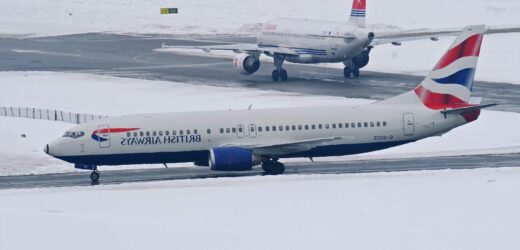HEAVY snowfall has caused chaos across the UK, with four inches falling overnight as temperatures dropped as low as -15.7C in Scotland.
This has also resulted in Brits being stranded at the airport, after runways were closed and airlines cancelled flights.
While it might be obvious why it's dangerous for planes to fly in bad weather, you might be wondering why we get it so much worse than far colder places in the world, such as Canada or Finland.
Andrew Ward, who worked as a Met Office meteorologist at Heathrow for 11 years, previously explained why this is.
He told Sun Online Travel: “The way that the UK suffers when it snows is due to the type of snow we get.
“There are two different types of snow – dry and wet. Canada has dry snow, which doesn’t linger and it can be blown away easily."
Andrew continued: “But we have wet snow in the UK, with a lot more moisture in it and that’s what causes disruptions.
“Wet snow is more of a problem as it turns to slush and ice, which is more difficult to clear than dry snow that can be easily blown or swept away.
“It makes it harder to keep the airport running smooth as there are additional hazards of ice, and aircraft need de-icing.”
This means that UK airports face a much more dangerous situation, hence needing to be extra vigilant which can cause more delays in clearing the runways.
MOST READ IN TRAVEL
Urgent holiday warning over hidden hotel room features that violate your privacy
Amazing hack for sitting in the aisle seat will make travel more comfy
I live on a cruise ship – here’s everything I eat in a day
Mum visits Butlins, Haven, Parkdean & Away caravan parks in a year- then rates them
The Met Office explains: "Fog, snow, ice and crosswinds mean that air traffic controllers have to increase the gap between planes that are landing, reducing the number of aircraft that an airport can manage.
"An aircraft that's stood overnight in freezing weather will need de-icing before its first flight in the morning.
"That's a fairly big task for one plane but imagine the task at Heathrow on a snowy January morning. At the same time there are miles of taxiways and runways to clear."
While Brits might think that they suffer with disrupted flights in poor weather, Andrew said that actually, Britain doesn’t cope as badly as some might think.
He said: “We don’t get that many major snow events, so when they do happen they’re a bit of a surprise. They are hard to predict and forecast.
"The UK is unique in its position next to the Atlantic and as such it is difficult to compare us to other countries.
“We don’t get major snow events every year unlike countries such as North America, Canada, Scandinavia who expect heavy snow annually – it’s in fact rare for them not to get what we would see as extreme snow."
While airports can prepare as much as possible, Andrew said that it can be hard to justify "spending the money on equipment that will only be used very rarely".
He said: "It’s simply not worth pumping time, money and resources into something that doesn’t happen every year.”
Earlier this year, a jumbo jet skidded off the snow-covered runway at O’Hare Airport in Chicago, although thankfully no-one was injured.
Here is what you should do if your flight is cancelled, as well as how to get compensation.
However, you are unlikely to get compensation if it is cancelled by the weather, as this is deemed to be out of the airline's control.
Source: Read Full Article








